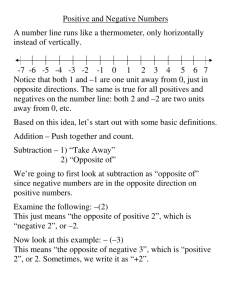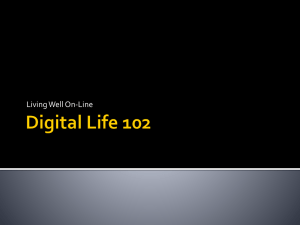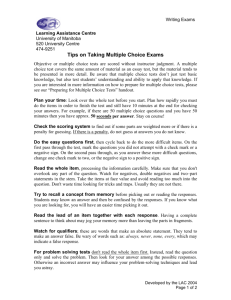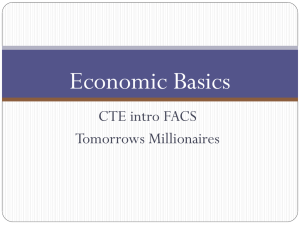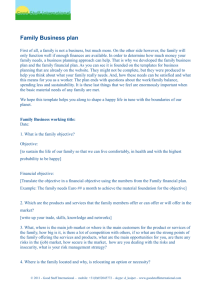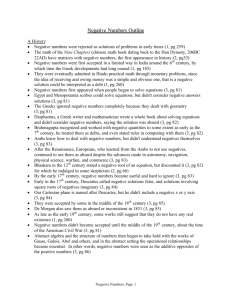Writing Multiple Choice Tests Academic Learning Centre 201 Tier 480-1481
advertisement
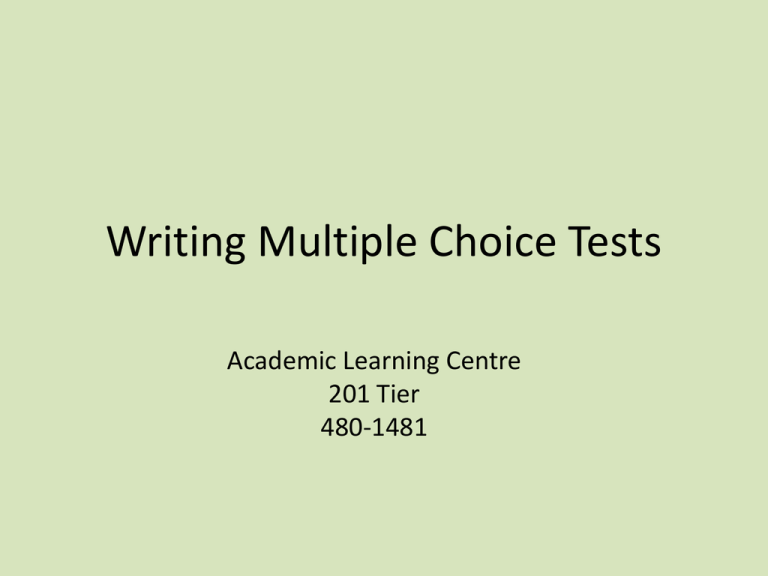
Writing Multiple Choice Tests Academic Learning Centre 201 Tier 480-1481 Hierarchy of Learning 1. 2. 3. 4. 5. 6. Knowledge (Recognition/Recall) Understanding/Comprehension Application Analysis Synthesis Evaluation Anderson, L.W., & Sosniak, L.A. (Eds.).(1994). Bloom’s taxonomy: a forty year introspective. Chicago: University of Chicago Press. 2 Knowledge Based Question The effect of primacy on impression formation was first studied in 1957 by: a) Freud b) Luchins c) Seyle d) Maslow e) Watson 7/5/2012 3 Comprehension Based Question According to research on first impressions, the primacy effect is a term used to describe: a) the impact of one’s initial impression on others that becomes difficult to change. b) how a person judges others through the lens of his or her own cultural framework. c) beliefs about what character traits will occur simultaneously in people. 4 Application Based Question You are at a party. A person walks up to you and accidentally spills a drink all over your new pants. You begin to dislike the person, even though everybody else claims that the person is really nice. Your reason can be attributed to: a) the co-variation rule b) implicit personality theory c) the actor observer bias d) the primacy effect © http://www.flickr.com/photos/alicechen/2360666712/sizes/s/ 5 Exercise Ex: Dad always says “give a firm handshake” def cause According to social psychologists, there is a cognitive bias known as the primacy effect that overemphasizes the importance of first impressions. This is generally assumed to be because people are especially attentive during introductions. 6 Preparing for Exams • Elaborate and create meaning • Apply concepts to real life situations • Study regularly and review frequently • Use active study strategies • Test yourself regularly 7 Which of the following is an example of a social PACER system that ranks people into a hierarchy? • • • • • Preview the whole test a) the caste system Arrange b) theyour class time system the estate system Cluec)words d) the feudal system Easy Questions first e) all of the above Review the test before you hand it in 8 Tips for Taking Multiple Choice Tests… Be systematic • • • • • Cover the alternatives and focus on the question Come up with your own answer Read each response one at a time Eliminate wrong answers Identify the best possible response Writing Multiple Choice Tests Some things to consider: • • • • • • • Absolutes (ex: always, only, never, every) Negatives and double negatives Word associations Unfamiliar content Similar responses Contrasting responses All of the above 10 Specific Determiners Watch out for words like: • Always, never, all, none, every, only ex: Mercury is always in a liquid state. False • Usually, often, generally, seldom, typically ex: Rembrandt typically painted portraits. True 11 Negatives and Double Negatives • Negatives: look for the false responses ex: Which of the following is not part of the cardiac cycle? ex: All of the following are found in plant cells except: • Double negatives: rewrite the sentence common ex: Which of the following is not uncommon? Word Association • Watch for words clues in both the stem and the response. Ex: Marrying someone outside of the group to which you belong is defined as: a) Polyandry c) Endogamy d) Exogamy e) Monogamy 13 Sensory memory can be defined as: a) memory that groups distinct pieces of information together. b) memory that is permanent and limited only by storage capacity. c) memory that briefly holds information in a person’s senses. 7/5/2012 14 Unfamiliar Content • Be wary of response items that contain content that you do not understand. a) Torpor is an alternative physiological state, during which metabolism decreases and heart rate slows down. b) Torpor is a physiological state that is conducive to somatic dematriculation of the ganglion. Similar Responses • When items are very similar, there is a strong possibility that one is correct. Study them closely. a) Discrimination is detrimental because it depletes a country’s social, economic, and political resources. b) Discrimination is detrimental because it depletes a country’s social, economic, and natural resources. water, energy, timber, and minerals Contrasting Responses • When you are faced with two options that are exactly opposite, there is a chance that one is the correct choice. ex: Torpor is characterized by (a/an): a) decrease in heart rate. b) increase in heart rate. c) increase in food consumption. © http://www.flickr.com/photos/kimmariecarter/4550149682/ Which of the following would be considered typical, if you were living in a tropical climate? a) There are forests filled with natural vegetation. T b) The climate is warm and wet in both summer and winter. T c) Rainfall usually comes from daily convectional rains ? d) All of the above. 7/5/2012 18 Do you ever change your answers? • If you have a reason to change the answer, change it! • Don’t play mind games with yourself. 19 Sources Carneson, J., Delpierre, g. & Masters, K. (1996). Designing and Managing Multiple Choice Questions. Retrieved April 7, 2009 from: http://web.uct.ac.za/projects/cbe/mcqman/mcqappc.html#C1 Practice multiple choice test. Learning skills program, Counselling Services, University of Victoria. Retrieved September 8, 2006 from: http://www.coun.uvic.ca/learning/exams/multiplechoice/ Test questions-Six Levels of Learning. Retrieved January 26, 2009 from http://www.coun.uvic.ca/learning/exams/sociologyexample.html The multiple choice exam. Learning skills program, Counselling Services, University of Victoria. Retrieved September 8, 2006 from: http://www.coun.uvic.ca/learning/exams/multiplechoice.html 20 Sources Anderson, L.W., & Sosniak, L.A. (Eds.).(1994). Bloom’s Taxonomy: A forty year introspective. Chicago: University of Chicago Press. Campbell, N.A. (1996). Biology (4th ed.). Menlo Park, Ca.: The Benjamin/Cummings Pub. Co. McWhorter, K.T. (2006). Study and Critical Thinking Skills. New York: Pearson Longman. Paul, K.(1996). Study Smarter, Not Harder. North Vancouver: Self-Counsel Press. Kehoe, J. (1995). Writing multiple-choice test items. Washington, DC: ERIC Clearinghouse on Assessment and Evaluation. (ERIC Document Reproduction Service No. ED398236) 21
